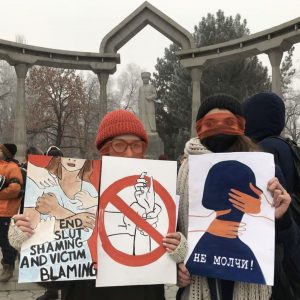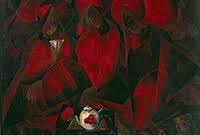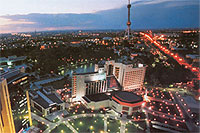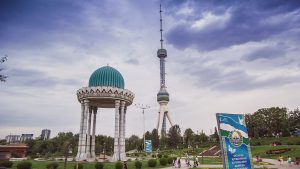culture
A la Une
- Naître à l’Est – Appel à contribution 01/01/2024
 INVITATION à participer au dossier n°76 de Regard sur l’Est Alors que la population de la plupart des pays d’Europe centrale et orientale tend à décroître, avec notamment une natalité et une fécondité peu dynamiques, les États ont tendance à prôner des politiques natalistes, voire familialistes, afin d’assurer le remplacement des générations et un équilibre économique pour le pays. Cette volonté des autorités, qui se traduit par des politiques publiques plus ou moins actives et dotées financièrement, complète ou, selon les cas, se ...Lire la suite
INVITATION à participer au dossier n°76 de Regard sur l’Est Alors que la population de la plupart des pays d’Europe centrale et orientale tend à décroître, avec notamment une natalité et une fécondité peu dynamiques, les États ont tendance à prôner des politiques natalistes, voire familialistes, afin d’assurer le remplacement des générations et un équilibre économique pour le pays. Cette volonté des autorités, qui se traduit par des politiques publiques plus ou moins actives et dotées financièrement, complète ou, selon les cas, se ...Lire la suite
- Born in Eastern Europe – Call for contributions 01/01/2024
 INVITATION to take part in issue no. 76 of Regard sur l’Est While the population of most Central and Eastern European countries tends to decline, with a low birth rate and fertility rate, governments are increasingly advocating pro-natalist or even pro-family ...Lire la suite
INVITATION to take part in issue no. 76 of Regard sur l’Est While the population of most Central and Eastern European countries tends to decline, with a low birth rate and fertility rate, governments are increasingly advocating pro-natalist or even pro-family ...Lire la suite - Alzhyr camp memorial: denouncing Soviet repression in Kazakhstan 02/01/2023Céline BAYOU*
 Inaugurated in 2007 on the site of the only Soviet concentration camp to have incarcerated an all-female population, the « Akmola Camp for the Wives of Traitors to the Fatherland » (ALZhYR) memorial reminds us that Kazakhstan was, during the period of ...Lire la suite
Inaugurated in 2007 on the site of the only Soviet concentration camp to have incarcerated an all-female population, the « Akmola Camp for the Wives of Traitors to the Fatherland » (ALZhYR) memorial reminds us that Kazakhstan was, during the period of ...Lire la suite - Mémorial du camp d’Alzhyr: dénoncer les répressions soviétiques au Kazakhstan 02/01/2023Céline Bayou
 Inauguré en 2007 sur le site de l’unique camp de concentration soviétique à avoir incarcéré une population exclusivement féminine, le mémorial du « Camp d’Akmola pour les épouses de traîtres à la patrie » (ALZhYR) rappelle que le Kazakhstan a été, durant la ...Lire la suite
Inauguré en 2007 sur le site de l’unique camp de concentration soviétique à avoir incarcéré une population exclusivement féminine, le mémorial du « Camp d’Akmola pour les épouses de traîtres à la patrie » (ALZhYR) rappelle que le Kazakhstan a été, durant la ...Lire la suite - Feminism in Central Asia: more and more voices are being raised 31/01/2022Vassilia MATTEI*
 In 2018, Zere Asylbek, a 19-year-old feminist activist and singer, caused a wave of outrage in Kyrgyzstan after releasing the track Kyz (Girl), which encouraged women to live freely. With her deliberately provocative clip, she wanted to provoke a social ...Lire la suite
In 2018, Zere Asylbek, a 19-year-old feminist activist and singer, caused a wave of outrage in Kyrgyzstan after releasing the track Kyz (Girl), which encouraged women to live freely. With her deliberately provocative clip, she wanted to provoke a social ...Lire la suite - Féminisme en Asie centrale : de plus en plus de voix s’élèvent 31/01/2022Vassilia MATTEI*
 En 2018, Zere Asylbek, militante féministe et chanteuse de 19 ans, a suscité une vague d’indignation au Kirghizstan après la sortie du titre Kyz (Fille) qui encourageait les femmes à vivre librement. Par son clip volontairement provocateur, elle souhaitait susciter un débat de ...Lire la suite
En 2018, Zere Asylbek, militante féministe et chanteuse de 19 ans, a suscité une vague d’indignation au Kirghizstan après la sortie du titre Kyz (Fille) qui encourageait les femmes à vivre librement. Par son clip volontairement provocateur, elle souhaitait susciter un débat de ...Lire la suite - Le Musée Sergueï Essenine à Tachkent recherche un conservateur 01/05/2010Farida CHARIFOULLINA
 Le Musée Sergueï Essenine est le second musée littéraire à Tachkent, après le musée Alicher Navoï, grand poète ouzbek du XVème siècle (1441-1501). Malgré sa petite superficie, à peine 183 m², le musée Essenine contribue pour beaucoup à la vie culturelle ...Lire la suite
Le Musée Sergueï Essenine est le second musée littéraire à Tachkent, après le musée Alicher Navoï, grand poète ouzbek du XVème siècle (1441-1501). Malgré sa petite superficie, à peine 183 m², le musée Essenine contribue pour beaucoup à la vie culturelle ...Lire la suite - Kirghizstan 15/10/2006Jean-François BADIAS
 Tout ce que je savais sur l’Asie centrale était faux. Les images largement répandues d’une Asie centrale de nomades habitant sous la yourte ont fait place à un monde étrange en reconstruction. Certes, je disposais d’informations par des proches, des ...Lire la suite
Tout ce que je savais sur l’Asie centrale était faux. Les images largement répandues d’une Asie centrale de nomades habitant sous la yourte ont fait place à un monde étrange en reconstruction. Certes, je disposais d’informations par des proches, des ...Lire la suite - Les rendez-vous de l’été : ces festivals musicaux qui créent l’événement 01/07/2006Géraldine PAVLOV
 À l’approche de l’été, les mélomanes ne savent plus où donner de l’oreille. Musique classique, traditionnelle, pop, rock ou électronique en Russie, en Ukraine, au Kazakhstan ou en Ouzbékistan, les festivals ont éclos depuis les années 1990 dans tous les ...Lire la suite
À l’approche de l’été, les mélomanes ne savent plus où donner de l’oreille. Musique classique, traditionnelle, pop, rock ou électronique en Russie, en Ukraine, au Kazakhstan ou en Ouzbékistan, les festivals ont éclos depuis les années 1990 dans tous les ...Lire la suite - Tachkent, lecture à pierre ouverte 01/03/2005Guillemette PINCENT*
 Voici pour vous une petite promenade dans la ville de Tachkent, capitale de l’Ouzbékistan, pays indépendant depuis 1991, qui se cherche, se trouve ou se perd, tandis que dans les rues, s’inscrit le choc des cultures et des identités. Tachkent, « ville ...Lire la suite
Voici pour vous une petite promenade dans la ville de Tachkent, capitale de l’Ouzbékistan, pays indépendant depuis 1991, qui se cherche, se trouve ou se perd, tandis que dans les rues, s’inscrit le choc des cultures et des identités. Tachkent, « ville ...Lire la suite - Tachkent en long et en large 01/04/2004Marion SEGRETAIN*
 S’il y a au monde des villes résolument verticales, Tachkent en est la parfaite antithèse: la première image qui frappe le voyageur venu par les airs est l’extrême horizontalité de la ville qui s’étend en quartiers indisciplinés, apparemment sans aucune ...Lire la suite
S’il y a au monde des villes résolument verticales, Tachkent en est la parfaite antithèse: la première image qui frappe le voyageur venu par les airs est l’extrême horizontalité de la ville qui s’étend en quartiers indisciplinés, apparemment sans aucune ...Lire la suite